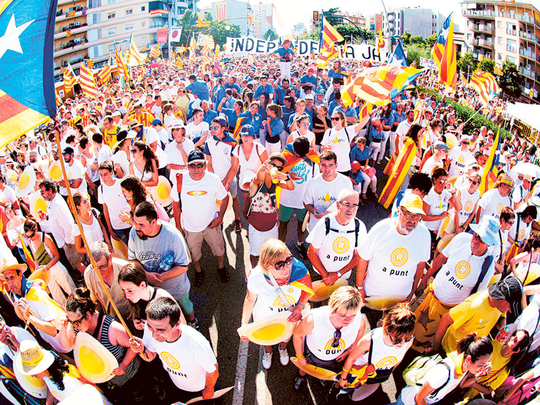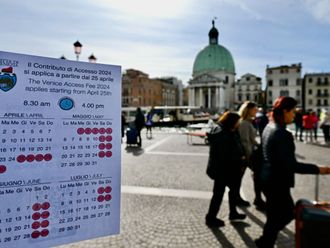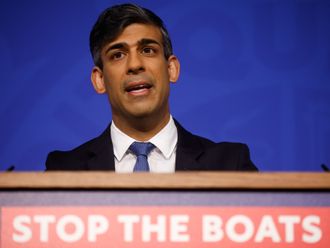
Madrid: The massed ranks of the separatist movement hauled themselves out onto the streets of Catalonia again on Sunday for their annual march to demand independence from Spain.
After four years of protests and campaigning, many of the protesters wore T-shirts with this slogan “on your marks,” signalling their goals may be within reach. But despite the flags and the firecrackers, there are signs that fatigue is starting to set in. The number of demonstrators was down by more than a third from last year as doubts grow about whether the regional government will make good on its pledge to force a definitive showdown with Madrid next year.
“The people are tired — I am tired of going to demonstrations,” said Diego Arcos, a 60-year-old charity worker and card-carrying separatist. “I’m fed up with the whole thing.”
When Catalans first took to the streets in 2012, Spain was on the brink of financial collapse after the credit crisis exposed the mismanagement and corruption of many officials in Madrid. The separatists, who had been a vocal minority since the 1970s, saw a chance to rally opposition to Spain at home and win support from across the European Union.
Since then, the EU has seen Russia take over part of Ukraine, a wave of refugees from failed states in the eastern Mediterranean and the false promises of the Brexit campaign help breach the 28-nation bloc. Spain on the other hand, now has better economic growth than much of Europe and talk of Barcelona as an city has won little sympathy. US President Barack Obama led calls last year for a “strong and unified Spain.”
Almost 2 million people, or just under 50 per cent of voters, backed pro-independence parties in last year’s regional election. Roughly the same number supported a split from Spain in an unofficial referendum in 2014.
That was enough to form a separatist majority in the regional assembly, though the breadth of that alliance — from anarchists to the Catalan business elite — has made for a bumpy ride. President Carles Puigdemont is wrangling with the anti-establishment group CUP who threatened to bring down his government in July in dispute over next year’s budget.
The sabre rattling is set to increase in the coming months with the CUP demanding a show of force from Puigdemont as a condition of its support on the budget while Spain’s acting Prime Minister Mariano Rajoy has signalled separatist leaders could face criminal charges if they defy the Spanish courts.
Rajoy is embroiled in his own battle to cling on to power after losing his majority in the national legislature last year and acting tough against the Catalans has been a consistent vote-winner for his People’s Party over the years. This month, as he appealed to lawmakers to give him another four years, he warned that the unity of Spain was at threat.
Tighter grip
Puigdemont has promised to have Catalonia ready to “unplug” from Spain by the middle of next year. But that timetable has been sliding as Catalan officials struggle with the practical and legal hurdles of setting up institutions like tax collection and social security systems.
Meanwhile, the Spanish government still controls taxes in the country’s biggest regional economy and officials in Madrid have tightened their grip on Catalan public finances since bailing out the regional administration during the crisis. (Catalans argue that the only reason their government got into financial trouble was because it’s been subsidising the rest of Spain for 30 years.)
“The independence process has been moving very slowly,” said Josep Maria Bellmunt a Barcelona-based doctor who is also a member of an pro-independence group called Now or Never. “When you drag out the process, you risk people outside of Spain saying the Catalans aren’t serious because in the end they never do anything concrete.”
Support for an independent state for Catalonia was at 41.6 per cent, according to a poll conducted by the region’s government pollster Centre d’Estudis d’Opinio in June, compared with a peak of 48.5 per cent in Nov. 2013. Local police in the five cities across the region that held marches Sunday estimated that 875,000 people turned this year compared with about 1.4 million last year.
“This year I haven’t heard much about independence,” said Eric Basset, 31, who runs a bar in downtown Barcelona offering protesters a special deal for a beer and a sandwich. “I don’t have in-depth conversations with my friends about it, it’s more something we joke about.”












